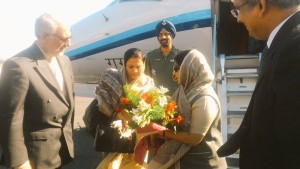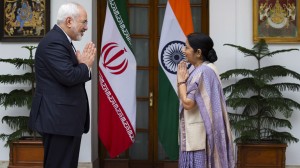
In a delicate balancing act vis-à-vis two major players in the volatile West Asia, India’s External Affairs Minister Sushma Swaraj will be in Iran over the weekend, days after Prime Minister Narendra Modi’s substantive visit to Saudi Arabia.
Mrs Swaraj will co-chair the India-Iran Joint Commission with her Iranian counterpart Javad Zarif and engage with the top Iranian leadership, including Iranian President Hassan Rouhani.
Betting on Iran Opportunity
The lifting of Western sanctions on Tehran, in the aftermath of the historic Iran-P5+1 deal, has set the stage for rejuvenation and acceleration of India-Iran relations in virtually all areas. Mrs Swaraj’s visit is, therefore, timely and will seek to upscale energy and economic ties with an emerging power in the West Asia region. The minister’s trip is also likely to set the stage for Prime Minister Narendra Modi’s visit to Tehran in the near future.
India has signalled its enthusiasm for harnessing the new Iran opportunity by declaring its ambitious plans to invest up to $20 billion in oil and gas as well as petrochemical and fertiliser projects in the Persian Gulf country. This was conveyed by Petroleum Minister Dharmendra Pradhan during his visit to Tehran last week. Swaraj’s visit will focus on fast-tracking the construction of India-aided Chabahar port and providing a strategic dimension to the India-Iran energy partnership. The Chabahar port is strategically crucial for India as it will help it bypass Pakistan and gain access to Central Asia and Afghanistan. The port, once completed, will emerge as the face of the rejuvenated India-Iran partnership in the 21st century.
 The two sides are also expected to discuss the repayment of nearly $6.5 billion that Indian refiners owe to Iran. India is expected to renew its pitch for rights to develop Farzad-B gas field in the Persian Gulf discovered by OVL.
The two sides are also expected to discuss the repayment of nearly $6.5 billion that Indian refiners owe to Iran. India is expected to renew its pitch for rights to develop Farzad-B gas field in the Persian Gulf discovered by OVL.
India-Iran bilateral trade was estimated to be $13.13 billion in 2014-15. There are around 8,000 students from Iran who are studying in India.
No zero sum
The successful visit of Mr Modi in Riyadh where he held wide-ranging discussions with the Saudi monarch and enhanced the ‘strategic partnership’ has aroused concerns in influential circles in Tehran about India’s attitude about expanding relations with Iran. The minister’s visit will allay these apprehensions and underline the Modi government’s dual-track policy vis-à-vis West Asia, which entails bolstering relations with both Iran and the GCC countries on separate tracks, without letting these relationships become a sort of zero sum game. This balancing act by India was evident during the visits of Mrs Swaraj and President Pranab Mukherjee to Palestine, Israel and Jordan in January 2015 and October 2015 respectively.
The Way Ahead
With the lifting of sanctions against Tehran opening up new vistas for reinvigorating India-Iran relations across the spectrum, there is a marked convergence of interests between the two sides on a host of issues. Iran has accorded India priority status in terms of developing economic relations, and seeks to leverage new opportunities arising in the world’s fastest growing economy and an emerging power. Indian companies are looking at the Iran opportunity anew and are looking to invest in a wide array of areas, including petrochemicals, agriculture, agri-processing, information technology, steel and hotels, tourism as priority areas for investment.
On the strategic side, India and Iran are looking to step up cooperation in stabilising and rebuilding Afghanistan in the transformational decade and beyond. With the shared perceptions on the Taliban, the two sides are expected to firm up counter-terror cooperation plans in the violence-best country. Iran, given its influence over the Syria situation, is also crucial to India to ensure stability in West Asia, home to 8 million-strong Indian diaspora and source of over 60 per cent of India’s energy imports. Building on new synergies and opportunities stemming from the lifting of Western sanctions, India is rightfully looking to leverage the full potential of its multi-faceted partnership with Iran.
Author Profile

- Manish Chand is Founder-CEO and Editor-in-Chief of India Writes Network (www.indiawrites.org) and India and World, a pioneering magazine focused on international affairs. He is CEO/Director of TGII Media Private Limited, an India-based media, publishing, research and consultancy company.
Latest entries
 India and the WorldMarch 3, 2024India-Denmark Connect: Red carpet for Indians to Red Sea cooperation
India and the WorldMarch 3, 2024India-Denmark Connect: Red carpet for Indians to Red Sea cooperation India and the WorldFebruary 17, 2024Munich Security Conference: Jaishankar, Blinken focus on Red Sea, Middle East
India and the WorldFebruary 17, 2024Munich Security Conference: Jaishankar, Blinken focus on Red Sea, Middle East India and the WorldFebruary 14, 2024Munich Security Conference report: Migration, war top security threats
India and the WorldFebruary 14, 2024Munich Security Conference report: Migration, war top security threats India and the WorldJanuary 23, 2024With “Ram to Rashtra” mantra, Modi consecrates Ram temple for national renewal
India and the WorldJanuary 23, 2024With “Ram to Rashtra” mantra, Modi consecrates Ram temple for national renewal







